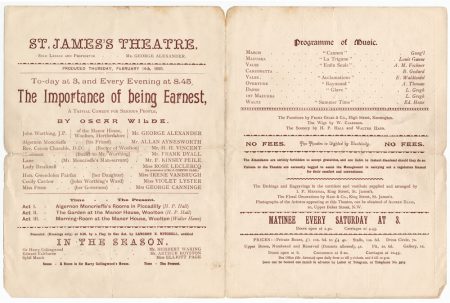 Oscar Wilde, the Irish playwright who became the darling of British high society, is probably the best-known and most-quoted satirist of the late 19th century. Born in Dublin, Ireland in 1864, Wilde became a well-known lecturer, essayist, and playwright who enjoyed near-universal popularity until the shocking trial that ended his literary career and, not long after, his life.
Oscar Wilde, the Irish playwright who became the darling of British high society, is probably the best-known and most-quoted satirist of the late 19th century. Born in Dublin, Ireland in 1864, Wilde became a well-known lecturer, essayist, and playwright who enjoyed near-universal popularity until the shocking trial that ended his literary career and, not long after, his life.
Wilde’s parents encouraged his intellectual pursuits. His success at Dublin’s Trinity College ended in his receiving a scholarship to Oxford University in England, where he won prizes for his academic achievements and his writings. He graduated with a degree in classics. Wilde was a strong proponent of the intellectual movement known as aestheticism, which emphasized the pursuit of beauty more than social-political themes for the arts. His lecture tour of the United States introduced him to many American artists and intellectuals, including the poet Walt Whitman. He continued lecturing upon his return to England in 1882.
Wilde began his professional writing career as the editor of the magazine Lady’s World. In 1888, he published The Happy Prince and Other Stories, a collection for children. Three years later, his only novel, The Picture of Dorian Gray, about a man whose enchanted portrait ages so that he can continue living a life of sin, was published in 1891. Dorian Gray was viewed as scandalous and immoral, a hint of troubles to come.
 The next year, Wilde’s first play, Lady Windermere’s Fan, made its debut to great acclaim. Playwriting became Wilde’s preferred literary style. Lady Windermere’s Fan was followed in short order by A Woman of No Importance in 1893 and both An Ideal Husband and his most famous play, The Importance of Being Earnest in 1895. Each of these works skewered the pretensions of British high society through clever wordplay and Wilde’s satirical wit.
The next year, Wilde’s first play, Lady Windermere’s Fan, made its debut to great acclaim. Playwriting became Wilde’s preferred literary style. Lady Windermere’s Fan was followed in short order by A Woman of No Importance in 1893 and both An Ideal Husband and his most famous play, The Importance of Being Earnest in 1895. Each of these works skewered the pretensions of British high society through clever wordplay and Wilde’s satirical wit.

Irene Vanbrugh as Gwendolen Fairfax and George Alexander as Jack Worthing in the 1895 production of ‘The Importance of Being Earnest’, from The Sketch magazine, London, March 1895. NAL 131655
Wilde’s gift for the cutting remark and his razor-sharp acuity about human folly would have made him a natural at Twitter, had social media existed at the time. As it was, he could be counted on to provide a smart remark about just about any topic:
“There is always more books than brains in an aristocracy.” —Vera, or The Nihilists
“The English mind is always in a rage. The intellect of the race is wasted in the sordid and stupid quarrels of second-rate politicians or third-rate theologians.” —The Critic As Artist
“One is impressed in America, but not favourably impressed, by the inordinate size of everything. The country seems to try to bully one into a belief in its power by its impressive bigness.” —Impressions of America
“If one could only teach the English how to talk, and the Irish how to listen, society here would be quite civilised.” —An Ideal Husband
“The Rhine is of course tedious, the vineyards are formal and dull, and as far as I can judge, the inhabitants of Germany are American.” —Letter to Robert Ross
“It is the Philistine who seeks to estimate a personality by the vulgar test of production.” —Pen, Pencil, and Poison
“There is no sin except stupidity.” —The Critic as Artist
The year 1895 proved both the pinnacle of Wilde’s success as an artist and the nadir of his personal life. Wilde was married to a woman named Constance Lloyd, and although he and Constance had two children together, it was no secret that Wilde’s true affections lay elsewhere. He had for years enjoyed a close relationship with Lord Alfred “Bosie” Douglas, the son of the powerful Marquess of Queensbury. When the Marquess found out about the relationship, he publicly accused Wilde of homosexuality, which was a crime in Great Britain at the time. Wilde sued the Marquess for libel, which proved his undoing. At the trial, excerpts from his writings and his personal letters to Bosie were presented as evidence. His libel case was dismissed. Wilde was convicted of “gross indecency” and sentenced to two years at hard labor.
Wilde emerged from prison a broken man, his popularity shattered and his family and fortunes gone. He spent the next couple of years in exile. His only writing from that period was the long poem “The Ballad of Reading Gaol,” which chronicled his prison experience.
In 1900, Wilde contracted a serious case of meningitis at the age of 46 while living in a shabby Paris hotel. Witty to the end, his reputed last words were, “My wallpaper and I are fighting a duel to the death. One or other of us has got to go.”
SOURCES:
https://www.biography.com/people/oscar-wilde-9531078
http://www.vam.ac.uk/content/articles/t/the-importance-of-being-earnest-first-stage-production/
http://quotes.yourdictionary.com/articles/oscar-wilde-s-reputed-last-words.html
